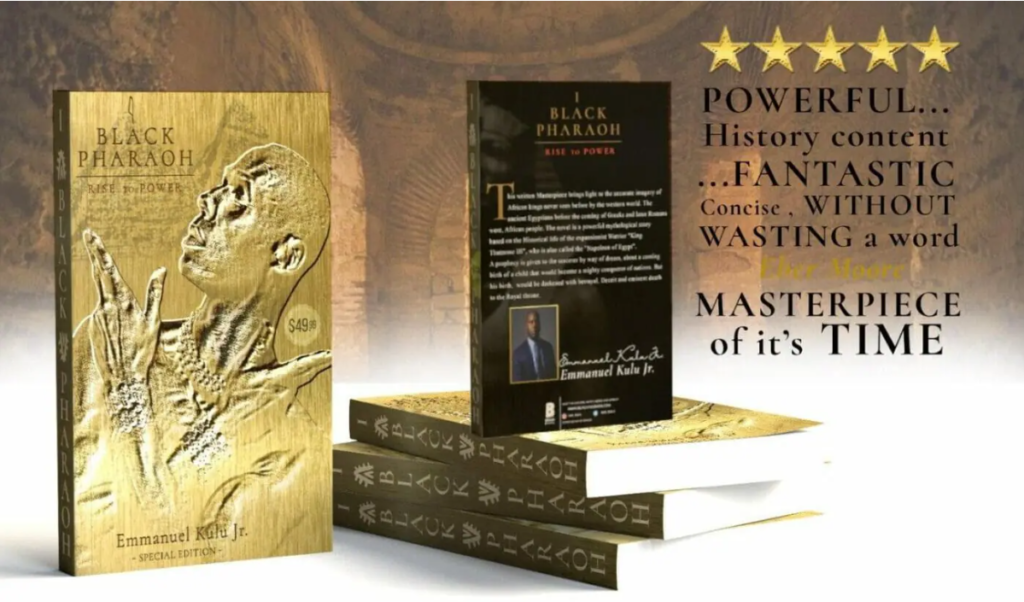
EMMANUEL KULU’S MYTHOLOGICAL NOVEL; I, black pharaoh: rise to power, is a bold new attempt to create new expressions for the black and African historical experience against a pervasive background of eurocentrism. The book and its author therefore, deserve all the interrogation one can afford. This is even more essential as we witness a resurgence of heart-wrenching black and African racial experiences in a world that sadly, has to be reminded that our common humanity shouldn’t have to be a one sided affair in a world that is clearly a rainbow of different lives.
An acclaimed film maker, Emmanuel Kulu, Jnr; is a man of many pasts and towering parts. Essentially, a historian of the African experience and teacher of black truths; he is engaged with rewriting the African cultural experience while asserting that our stories are tales of bravery and courage in a world where the mouthpiece media may never pay attention to African historical facts if it doesn’t suit certain interests.

With an interesting history as a social worker, creative artist and music entrepreneur; Kulu possesses a fine grasp of the struggles of marginalized peoples and their tortuous attempts to tell their stories whether through films, songs, dance art, history or fiction. This founder of the defunct hip-hop platform, tephlon entertainment; now stands as a bulwark to misrepresentations of the African and black historical experience in today’s mainstream media and fictional marketplace. It is against this backdrop that he finds relevance in one’s estimation.
I, Black Pharaoh: Rise to Power, can be validly assessed as a towering contribution to the body of literature which seeks to right historical misrepresentations about the greatness of the black man. In more ways than one, Kulu is strategically placed to tell this story. He has the historical consciousness of a proud socio-political heritage. His linguistic capabilities aside, he is a holder of those greatly storied Bantu/Zulu genes, a quality which also makes him eminently qualified to take on the task of this historical fiction. This is so because the Zulus of South Africa have a glorious history which is often not adequately highlighted. They once produced Chaka Zulu, that Assegai-throwing battle hero possessing of a fighting ingenuity that ranks among those of any fighting strategist anywhere in human history. But perhaps, Americans and Europeans have chosen to know more about Napoleon, and the famous chief officers of the American Civil War such as General Robert E. Lee and General Ulysses S. Grant. Without a grain of doubt, all of them have earned their places in history, but there seems to be a sidestepping of African ancient cultures within certain circles and that has made Emmanuel Kulu, a travelling Adjunct Professor, turn his intellectual binoculars on ancient Egypt and other African cultures. He tells me the impulse behind this book:

”I was always fascinated with Kemet (ancient Egypt) and I have always known it was a black African civilization. But despite my own personal knowledge and research, the western world has deliberately force-fed the Eurocentric Ancient Egypt through literature, film, or media. My father always told me; “Africans must tell African stories.” As I grew in knowledge and understanding, I wanted to deliver this truth to the world.”
Perhaps, many have failed to realize that the 25th Egyptian dynasty was the kingdom of Kush which was controlled by black Pharaohs. Kulu’s book seems to echo this historical truth, by insisting that there were indeed black Pharaohs who ruled ancient Egypt with pride and power. It is only now that pervasive depiction of the history of Egypt; appears to always relegate them to minor characters in an epic human narrative. This does not have to be so. That appears to be the honored view taken by Emmanuel Kulu. But he had his fair share of challenges while attempting to take this position. He confesses below.
“In the middle of my writings, I chose my book cover from my graphic designer and I was very excited to share it with the world. Upon posting it in book clubs via social media, I received some great feedback and some extremely hateful comments. My cover displayed a Black African Man as Pharaoh, which caused some to send hate mail and even death threats. I became very discouraged for some time, which made it difficult to continue to write the project. After speaking to my father, he told me; “Don’t focus on the negative and those that refuse to be open minded. Focus on those that want to learn more. The truth is never easy accept when it doesn’t fit a certain narrative or agenda. Continue the truth and Triumph against all odds.” This strengthened me to continue forward. The second challenge was getting published. Once the writing was complete, I sent it to over 500 different publishers and was turned down for one reason or another. Finally, after many months of bad news, I received an email from Debi Stanton President and CEO of Pen it! Publications who loved the story and cover. They offered me an excellent deal, my agent reviewed it and I signed on the dotted line. We have been rolling ever since.”
During Black History Month, now is the time more than ever before, to champion the cause of Emmanuel Kulu’s book because it is, indeed, the triumph of the black, African and human spirit, within a literary and political culture that seeks to diminish its historical worth. After all, Barack Obama has already reminded us eloquently that: “All of us will trumpet those qualities we believe make us uniquely qualified.” The historical existence of black Pharaohs makes the black man “uniquely qualified” to claim his fair share in the history of ancient Egypt and human civilization. This is what Emmanuel Kulu seems to have said in his gigantic book. He deserves our honest adulations for the simple reason that: “The book is a Historical Adventure that will keep readers page turning and hungry for more. The novel will transport readers into the Golden Age of Africa like never before. It contains many twists and turns, suspense, fantasy, love, betrayal, and epic battles of these historical royal figures. The novel also has 20 illustrations, the Hardback Edition is Colored & the Paperback Edition is B&W. You have often heard of Cleopatra, but Hatshepsut the greatest Egyptian Queen who became Pharaoh ruled the world for 20 years. This will call to mind strength of the African Woman. Also, you will behold the coming of Thutmose III the greatest conqueror Pharaoh in Egypt’s history.”
The author provides a fitting close but there is more at: https://www.iblackpharaoh.com/
https://www.amazon.com/I-Black-Pharaoh-Rise-Power/dp/1951263928/ https://www.amazon.com/Black-Pharaoh-Golden-Age-Triumph/dp/1954868812/
Source – https://myafricanmagazine.com/emmanuel-kulu-searches-for-truths-through-historical-fiction/
